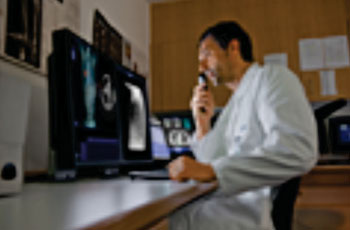Oncology Software Update Compliant with New BTS Guidelines
By MedImaging International staff writers
Posted on 24 Aug 2015
A key diagnostic imaging vendor has announced that it has modified its oncology software solution to ensure compliance with new British Thoracic Society (BTS) guidelines for lung nodule screening.Posted on 24 Aug 2015
The BTS developed the new evidence-based algorithms and recommendations to save clinicians time and improve outcomes for lung cancer patients. Improved estimations of the size and growth rate of lung nodules are vital in helping oncologists understand whether a nodule is cancerous, and to help them decide on treatment options. According to Cancer Research UK (London, UK) lung cancer is the second most common cancer in the UK, accounting for 13% of all new cases of cancer.

Image: Siemens Healthcare’s syngo.via MM Oncology facilitates compliance by clinicians to British Thoracic Society guidelines for the investigation and management of pulmonary nodules.(Photo courtesy of Siemens Healthcare).
The syngo.via MM Oncology software solution was developed by Siemens Healthcare (Erlangen, Germany) and should help oncologists comply with key areas of the new guidelines. According to the guidelines, automated or semi-automated volumetric measurement is the preferred method for assessing coin lesions, and is more accurate than diameter measurements. Siemens Healthcare’s software solution can help clinicians measure nodule volumes, and quantify growth rates or reduction of nodules between the initial and the follow up scans.
Greg Baker, lead applications specialist User Services and syngo.via at Siemens Healthcare, said, “As standard, all of our customers using syngo.via are provided with a range of fully automated tools specifically designed to support clinicians in the detection, segmentation and evaluation of suspicious lesions including dedicated tools for the volumetric measurement of pulmonary nodules. The guidelines from BTS are a welcome change to ensure accuracy in measurement and evaluation. We are looking forward to working with our customers to assist with guideline compliance so clinicians are able to receive the valuable information they need to make a confident diagnosis.”
Related Links:
Siemens Healthcare
Cancer Research UK














